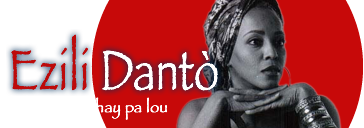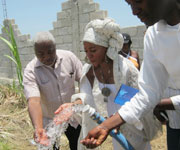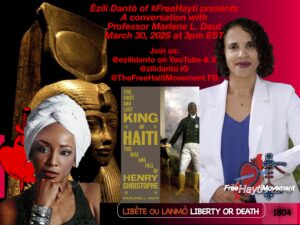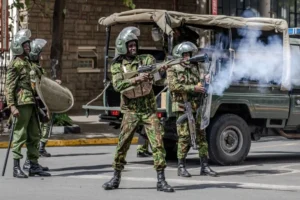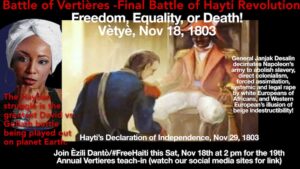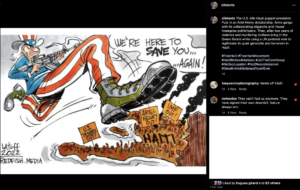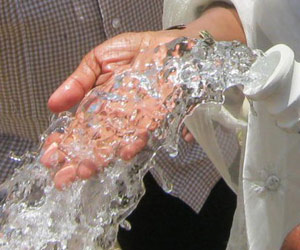Ezili Dantò’s Note:
This official report of the Haitian Football Association on the expulsion in Jamaica of the U-17 Haiti football team is translated into English by an HLLN member, Myrtha Désulmé, President of the Haiti-Jamaica Society in Jamaica. Go here to sign the petition asking for an apology and justice for the children. The original Haiti football association report, in French, may be downloaded here.
Read official (in French) Haiti Football association report, online:

*********
REPORT ON THE TRIP OF THE NATIONAL U-17 TEAM TO MONTEGO BAY
The National U-17 team, which qualified for the finals of the CONCACAF championship in their category, competition which also qualifies them for the FIFA World Cup Mexico 2011,
left Port-au-Prince on 3 February on board a charter plane of the national airline TORTUGAIR.
Departing at midday the delegation landed about 1 hour later at the airport in Montego Bay.
The plane was carrying 19 members of the delegation, including 15 players and 4 Officials; two of the Officials being Brazilians, one a physical trainer, and the other a Goalie trainer.
Continuous and repeated medical visits
Given that there is no Consulate of Jamaica in Haiti, our applications to obtain visas began about one month before the departure date, via CONCACAF in the USA, by sending all of the players” personal information (passports, dates of birth, etc …). Finally, about 1 hour before departing Port-au-Prince, a letter confirming that the visas would be issued at the airport upon arrival was sent over the Internet.
A first: medical review prior to the granting of visas at the airport
Our first contact upon landing on Jamaican soil was with a team from the Ministry of Health, who carried out an extensive medical interrogation of each member of the delegation, in a room at the airport, even before the granting of the visas. Each member was asked the same questions: Have you had diarrhoea? Fever? Do you feel okay? Do you suffer from headaches? Have you contracted cholera? The interrogation was followed by a brief physical examination, and a body temperature reading was taken by placing a thermometer under the armpits.
Follow-up medical or discriminatory persecution
This same operation dubbed “follow-up medical” would be repeated practically every three days, as the team which had been present at the airport was to visit the delegation every two or three days in the Falmouth guest house, where we were staying. It was always the same interrogation, and regular monitoring of temperature, to the point that the players started to complain of medical harassment. After a few hours at the airport, the visas were granted, and the group got on the bus, which headed to the town of Falmouth. Given the importance of the tournament, and our very high chances of qualifying for the next World Cup, the Federation had decided, to arrive in Jamaica early, in order to get acclimatised to the conditions of the tournament. The first part of our stay, from 3 to 12 February, was therefore totally organised by ourselves, and was also completely at our own expense. The Haitian Football Federation had asked Noel Miller, a Jamaica Consultant based in Miami, who has always been very close to Haitian football, to coordinate the entire stay in Jamaica for us. Our group was joined the following day, 4 February, by Wilner Etienne, Head Coach, who had made the trip via Miami due to the limited capacity of the charter plane (19 seats only). The Federation also wanted him to meet and accompany three players who were travelling in from Paris.
Three other players born and licensed in France, Jefferson Savey, Luckenson Démosthènes, and Renato Etienne, also flew in from Paris via Miami, with Wilner Etienne on February 4, on an American Airlines flight. The group would be complete with the arrival of Clifford Nau on 9 February, and Andy Anglade, on 11 February, who both attend school in the US. Edson Tavares, the Brazilian Coach arrived from El Salvador via Miami with the President of the Haitian Football Federation. The last person to arrive was the Team Manager, Jean Roland Dartiguenave, who arrived from Port-au-Prince on the morning of 13 February.
On 12 February, the delegation was transported from Falmouth to the Montego Bay Hotel IBERO STAR HALL BEACH, along with several other teams participating in the tournament, including Panama, El Salvador, Cuba, USA, Canada, Costa Rica, etc.
Until the first game on 14 February there were virtually no incidents, except for the incident with Coach Edson Tavares, the Brazilian coach of the senior national team, who arrived on 10 Feb from El Salvador, where the senior national team had just played a friendly match on 9 February. He came to advise the staff of the U-17.
Two players and Tavares have fever
On the morning of the match, 14 February, Edson Tavares woke up again with a fever he had reported the previous day despite the drugs he had received (4 tylenol 500 mg q.i.d + ascorbic acid 1gm q a.m). Worse, he had chills, and I recommended alerting the Liaison Officer, and getting him some medical care, which provisions are made for in this kind of tournament. He did not go to the stadium. By contrast, the other 2 players said that they felt better, and were in fact even selected among the 18 listed on the score sheet. Better yet, Londeau started out in left-back position. But during the match their condition deteriorated, and we therefore had to take them to the hospital, where they also met Edson upon arrival, who had been there from morning.
Healthy players reported symptomatic and forced into quarantine
Isolated shortly after the match, and even before returning to the stands to watch the second match USA-CUBA, the same medical team, which had been following us from arrival, came to the stadium and invited the entire delegation into a room adjoining the locker room: we went through the same routine with the same questions, and this time they decided that two other players, Gédeon Daniel and Rommel Desrosiers, had a “borderline” temperature (37.7 according to the players), and they asked the players to follow them.
Aggression and harassment all the way to the locker room
The four players, plus the Liaison Officer (a Haitian living in Jamaica, was curiously also forced to submit to their control), and all were invited to follow them to the hospital. The suffering endured by the players would be hard for them, having just competed in a temperature of almost 40 degrees in the shade (kickoff was at 12:30 pm). Feeling that they were wasting too much time in a crowded hospital, where nobody was paying any attention to them, or to their status, when World Cup regulations provide for the best possible medical care available, Edson, the Liaison Officer, and four other players, exhausted after waiting all day seated on a waiting-room chair, with nothing to eat, decided to return to the IBERO STAR Hotel. After examining them, noting that they had a symptomatology resembling malaria, I asked to be taken to a pharmacy to buy anti-malarial medication, because we did not have any in our emergency kit. Given that the Falmouth pharmacies were closed, we were taken to JJ Pharmacy in Montego Bay, but the pharmacist requested a “Jamaican” prescription. We therefore left to go and find a doctor who could assist us with our patients, when I received a call from a FIFA soccer colleague, Jamaican Tony James, asking me to join him right away. Given his insistence, I returned to the hotel.
With CONCACAF Director, Mrs Jill Francisco, they asked that the players and the Coach, who had just returned to their hotel rooms, completely dejected, promptly return to the hospital, or be forced to do so by the police. My reply was that we wanted very much to go to the hospital to seek treatment for both players and for Professor Tavares, but that they had not been attended to at the Cornwall Regional Hospital in Montego Bay, and would prefer to go to a private clinic. It became clear that we had no choice on the matter, and we decided to go back to the hospital, after being assured that a doctor was awaiting us. I accompanied my patients to the Trelawny Medical Centre, at the Falmouth Medical Centre, without being told that they would be “detained”. Please note that they insisted that Rommel and Gédeon, who were still in excellent shape, were also being requested to return to the hospital. We were assured that the visit would be brief, so much so that nobody thought of taking any personal effects with them. Again, the wait was very long … very long in an insalubrious centre in the midst of indigents suffering from various conditions, in a very uncomfortable environment. At about midnight an Indian doctor appeared, and announced that they would have to stay at the hospital. We were shocked and outraged, when they led the group, including the Liaison Officer, all the way to the back of an old building, which was unspeakably filthy. The two who were sick, were given beds upstairs in a common room amongst about 10 other patients, (where was the supposed isolation?), astonishingly amongst patients suffering various types of pathologies. The two others, Gédeon and Rommel, (whom the man decided were sick), given that they were healthy and feeling fine, began to cry, and along with the Liaison Officer, who oddly continued to be placed amongst the patients, they opted to remain out in the courtyard under a drizzling rain, rather than go into the room; Professor Tavares consistently refused to stay in these insalubrious places, and returned to the hotel with me, driven by a friend who had come for us, (because the health services van had left without telling us). We left at about 4 am after waiting in vain for a return call from my friends Messrs Burrell and Reid, two Friends from the Jamaica Football Federation, whom we had alerted to the situation.
Prisoners in a hospital or in a brothel
The next day was the opening of the Caribbean Football Union Congress, attended by the Minister of Sports, Youth, and Culture of Jamaica, (a lady with beautiful manners, who tried to mitigate the ordeal), and the Mayor of Montego Bay. From the first break, I drew their attention to the need for better hospital conditions to be provided for high-level athletes and Ambassadors of our country. The President of CONCACAF organized an emergency meeting, and the Minister decided to take the matter in hand. She did even better, and accompanied us to the players” hotel. She met with them, and in a beautiful speech, she reassured them that their four teammates would be moved to a “new” hospital with a medical team specially assigned to take care of them. She did even more. She went personally to Professor Tavares” room, and reassured him that the ordeal of the previous night was of the past, and that she would personally accompany him in her car to the new medical centre. So convinced was the Coach by these promises, that he immediately took his luggage, and went down into the hotel lobby.
Lies to placate
The tragedy is that no promise was ever followed by implementation. On the contrary, shortly after the departure of the Minister, who apologised for having to tend to an emergency in Parliament in Kingston, the Mayor of Montego Bay, this time accompanied by armed men, reinforced by menacing hotel security guards, backing the same medical team, appeared at the hotel announcing that the entire group was to follow them to the hospital. We told them that it was the team’s training time, and that the time could not be changed. The medical follow-up would have await the players” return. They forcibly prevented the team from boarding the bus, and the players, totally disheartened, were persuaded to accept the short interview, which we thought would be as brief as possible, to permit us to get to our training session, given that the next day’s game was crucial to qualify for the second round.
As soon as the Minister left, the situation deteriorated, despite the efforts of Mrs. Jill Francisco, the Director of CONCACAF Competitions, who fought to curb the aggression of the hotel “goons”, and of the armed men accompanying the Mayor.
Where could the youngsters have contracted this imaginary malaria?
The interview turned into a prison, given that after the temperature controls, it was announced that nine others people (players Benchi Estama, Clifford Nau, Jefferson Savey, George Kerlens, Edson Etienne, Renato Etienne, Team Manager Jean Roland Dartiguenave, Equipment Manager Max Bien Aimé, Mr Anglade, the parent of a player who himself resides in the US, and had come into the room by chance, to offer his services as an Interpreter), were all declared to have a borderline temperature and “classified sick”, and therefore forced to be placed in isolation at the hospital. We were never given a choice, though we tried to bring to their attention, that if Jamaica is a ‘malaria free’ country, as we were being told, that would mean that the vector which transmits the Anopheles mosquito does not exist here. How, then, could youngsters coming directly from France and the USA, travelling out of those countries for the first time in their lives, contract it here? But the attitude was not in a spirit of dialogue. The response to every attempt we made to understand what was going on, was always “in Jamaica, we have our protocol”. We asked for a guarantee on the delivery time of the results of the malaria tests, which they were going to submit to, and we were promised that the results would be delivered within 12 hours” time. This would take us to the next day 3:00 am, a time which we, in our naiveté, calculated would still allow us sufficient time to make our game the next day against El Salvador. But the tone and aggressiveness only escalated, because the youngsters and their Officials were immediately and forcibly locked up in the “consultation room” (a discotheque hastily reconsecrated into “ground zero” in the basement of the Hotel IBERO STAR, and turned into a prison). Hotel security guards reinforced by the Mayor’s security guards, posted themselves outside to prevent the “sick” from returning to their rooms to collect their personal effects, or even to take a shower. The only privilege which was granted was the use of the toilet, and even then, the person was always flanked by two security guards, the guns of the Mayor’s menacing-looking security always being very visible. In the meantime, the four youngsters at the hospital were sending SMS texts informing us that they had never been taken to any “new centre”, and that they had not yet even been allowed to eat or shower, and that includes the 2 declared “sick” the day before on the basis of “borderline” temperatures. Kindly note that the results of the tests carried out 24 hours earlier, were still not available.
No paraclinical test results; tests which take several days
CONCACAF discreetly informed me that they were unable to find hospital beds for the new “convicted-sick”, which was rather fortunate. Edson and the players waited for up to 8 hours.
Finally it was decided that the quarantine would be organised at the hotel, via a new hotel rooming list. The sick were grouped together, and prohibited from leaving their rooms, and separated from “those not yet found to be diseased”, which resulted in a mixture of adults and children in the same rooms.
It was not the end of our travails, as hunger gripped the boys despite CONCACAF’s insistence. We decided to call President Jack Warner, who was about to leave for Port- of- Spain. He joined us at the hotel around 8:00 PM accompanied by Captain Horace Burrell, President of the Jamaica Football Federation, and we began a cold analysis of the situation. The statements of the Jamaican Official were that the Jamaican Government was furious, and did not want Haiti in the tournament anymore, on the pretext that they were all
diseased, and if they had any advice to give me, it would be to leave, because the Prime Minister of Jamaica was going to make an aircraft available for the Haitians to return home. I insisted on our determination to play our matches, given that we were sure that all of the malaria tests carried out on all of the players would return negative (except for the two who had really been symptomatic), and that we would be in a position to have eighteen players available, in order to field a good team. President Warner’s facial expression, and his final words were that there would never be any test results, and that this quarantine
would consequently continue as long as we remained in Jamaica. Shortly after, in the hallway of the hotel, there transpired, what I would call a final intimidation session, in which the Mayor brought me together with the Managers of the hotel, and the CONCACAF Director. Right from the outset, he declared that he had decided to “change gears”, because he had realised that I did not want to collaborate. He announced that the Jamaican Government had not found the 30- seater aircraft, but only a 10-seater, and that the prime suspects must at all costs leave Montego Bay immediately or early next morning. The hotel Manager stressed the point even more, and declaring in a very menacing way, that from tomorrow midday, he would no longer accept anyone in his establishment.
It was clearly no longer a question of tests or results. The medical team was still there, and they remained silent when we asked them for the test results. We understood then that the noose was getting tighter by the hour. The Mayor threw at us, that tomorrow morning he would come and throw us out of the hotel. CONCACAF advised us, to remain in our rooms, and not to open our doors to anyone, for any reason whatsoever. At 6:00 am, I received an e-mail from Ms. Francisco, confirming that CONCACAF had chartered a plane for that afternoon.
Despite the refusal of the “foreign” players, it was decided to administer a dose of anti-malarial medication to all members of the delegation. The youngsters from France and the US asked that they be allowed to inform their parents first. It was to no avail. That meant that everything was really over for us, as everyone knows the disastrous effect of chloroquine on the red blood cells, which are so important for the physical condition of athletes.
On Wednesday 15 February, the Minister returned to make the travel arrangements. It was decided to keep in quarantine the 4 who had to return to their foreign homelands, because they were not allowed to take a commercial flight, based on the famous “Jamaican protocol”. They were therefore maintained in quarantine until Thursday, when they were taken to the airport under heavy security, to board the plane. As regards the group going to Haiti, a Miami Air charter collected us at the airport. We managed to avoid the last humiliation, which would have them forcing us to go out through the back door of the hotel. Gathering all of our courage, I decided that we would brave the security guards to cross the finish line, and go out through the lobby, through which we had arrived.
CONCLUSIONS
1 – They were clearly awaiting our youngsters: most probably due to the cholera outbreak, resulting in the medical persecution, which they suffered daily. Naively, every day, the Leader of the group thought that all of this was the norm in that country, while out of 11 delegations, Haiti alone was the subject of such surveillance. In their blindness, they did not even bother to check and establish the history of the youngsters, which was in their records: If they had done so, they would surely have avoided including youngsters like Anglade, Savey, and Renato Etienne,
who have never travelled outside of France, or even Anglade and Nau who left Haiti a long time ago.
2 – They did not want us to be in their country, but as they could not find a way to shorten
our stay, they sought to prevent us from playing by reducing our pool of available
players. (After the second quarantine, we had 8 players available. It was quite Machiavellian, as they knew that one of our players had been expelled, and was therefore unavailable.)
3 – The minute the match against El Salvador started, which meant that we were eliminated by default, the “quarantine was relaxed”, and restrictions virtually disappeared.
4 – The proof is that the results of the malaria tests carried out on the 2nd group, which were promised 12 hours later, have up to now never reached us, four days after our return to Haiti; nor has the document to prove that it was the forced quarantine, which prevented the team from competing in the tournament, forcing it to lose by default.
5- As President of the Haitian Football Federation, and the team’s official doctor, I was never allowed to see any of the temperature control reports, or to even look at the thermometers after the tests were done.
6- All of the above transpired in the total absence of any representative of the Jamaica Football Federation, which was the official organiser of the tournament.
7- Haiti was forced to leave Jamaica due to the fact that 2 of its players became ill, and most of the team was “sequestered”, all while being asymptomatic. They were unilaterally diagnosed with “border line” temperature, and even before confirmation tests were effected, were prohibited from playing, and it was demanded that we leave Jamaican territory.
Over and beyond these compelling facts, the most difficult aspect of the experience was the repressiveness, the aggressiveness, I would even say the hostility of the medical team, which every day, harassed a delegation of minors, while the other delegations were treated differently. It is clear that there was predisposition, and psychological aggression was perpetrated against these Ambassadors of our country.
Contact person in Jamaica: Mrs Jill FRANCISCO, CONCACAF Director of Competitions, whom we take this opportunity to thank, as the trauma would have been much more severe.
Dr Yves Jean Bart
Internal Medicine, Sport Medicine
President – Haitian Football Federation
Add a comment:
Powered by Facebook Comments
